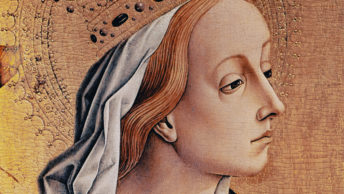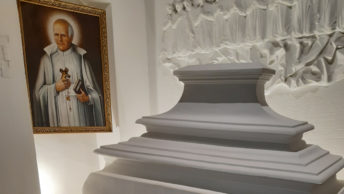According to Servant of God Frank Duff, the answer is yes. In his 32-page booklet published under the same name in 1929, he explains how.
Who Is a Saint?
Duff says that few Catholics seriously attempt to become a saint because they don’t understand what a saint is and don’t believe sainthood is achievable. They assume that extraordinary penances and miracles are essential, so they become discouraged. The good news is that neither is required.
Instead, Duff defines a saint as someone “who with the object of pleasing God, does his [or her] ordinary duties extraordinarily well.”
“Such a life,” Duff indicates, “may be lived out without a single wonder in it, arouse little notice, be soon forgotten, and yet be the life of one of God’s dearest friends.”
In fact, you shouldn’t strive to be remembered as a saint or for greatness; rather, your mission is to be loved by God. And God loves the humblest men and women.
Matt Talbot is a shining example of an unremarkable individual who was an extraordinary Catholic. For those not familiar with Matt, he was a beggar, tramp, and drunk that turned his life around and dedicated it to God. There was nothing special about him. Dubliners would have passed Matt in the streets, not even batting an eye at the little Irishman with holes in the knees of his pants and a well-weathered hat shielding his balding head. Only after he fell dead in the streets in 1925 did people discover his true holiness. Overnight, the simple man became a venerated figure in Ireland.
“Nobody knew he was a soldier of the cross, with knightly armor tight against his flesh. Nobody knew he was a courtier and a lover and a slave of the loveliest Queen God ever made,” biographer Eddie Doherty wrote. “Nobody suspected he might, some day, be enrolled among the greatests of the saints.”
If Matt could be saintly, anyone can be.
Frank Duff quotes Saint John Henry Newman, who said that to be perfect, “first do not lie in bed beyond the time of rising … make your evening meditation well; examine yourself daily; go to be in good time, and you are already perfect.”
Every person is called to be a saint, no matter how unfit he or she might think he or she is for holiness.
For those who think their particular life and surroundings are unsuited to sanctity, Duff reminds them that among the saints “are kings and beggars, and representatives of every trade, slaves, hermits, city people, mothers of families, invalids, soldiers, and persons of every race and colour.”
“The conditions of each man’s [or woman’s] life, as it is,” Duff says, “are the raw materials out of which he [or she] has to fashion his [or her] fortune.”
Profession of Faith
Modern Catholics desire most the approval of their peers and fear being mocked for their faith. At first, when Duff joined a religious organization that renounced alcohol, he didn’t like the idea of wearing the organization’s pin on his coat that broadcasted his abstinence from spirits. Later, he embraced it and commissioned a jeweler to make a special badge for him that he could proudly display. Similarly, every day, Matt Talbot wore two old black pins crossed on his coat to signify his faith.
Don’t be afraid to publish the fact that you love God and have faith by wearing some devotional badge, cross, or emblem.
“In a word, you are so taken up with making your conduct acceptable to others that you have no room for the thought that God might have been pleased by these little open professions of faith,” Duff writes. “You treat Him as the rich are supposed to treat their poor relations — acknowledging them in private, ignoring them in public.”
How many times have you shied away from doing the sign of the cross on the bus or an airplane or you didn’t say a prayer before your meal in a restaurant, fearing someone would notice your profession of faith? How about when your faith comes up in conversation with friends or family members, and you downplay its importance in your life or avoid the topic altogether? We’re all guilty at times of shunning our faith to avoid being ridiculed or to risk offending someone, even when we feel that gnawing sensation that we should do otherwise. You are not alone. We all struggle with it.
Jesus didn’t abandon us, so we shouldn’t abandon him. You can be respectful to someone’s differing faith and beliefs while still conveying the importance of Catholicism in your life. You might even inspire someone by a simple profession of faith.
Daily Reading
“Duff says, “Read good literature; get others to read good literature; and later, all of us will do good deeds.”
We should embrace spiritual reading, whether it’s the Bible or a book about a saint, missionary, or holy person. The more we read, the more interested we will become in learning about our faith.
“We must form a taste for religious literature,” Duff states. “It must take a definite place in each day, from it we will acquire an interest in religion.”
Also, he explains, if we frequent these holy individuals’ company, “we will soon imitate their qualities.”
Set aside half an hour each afternoon or evening to read a few pages or a chapter of a book about a saint, holy person, or an inspiring religious story. You might be surprised how this little bit of spiritual reading will inspire you to imitate them in your own life. There is much you can learn from their actions.
Yes, You Can
So, yes, you can be a saint. While you or I might not be the next Saint Bernadette of Lourdes or Saint Therese of Lisieux, we don’t have to be. Strive for sainthood, yes, but work at being a humble, moderate, dutiful, and faithful Catholic. And if you believe you’re already all of those, then work at being better at each one. There’s always room for improvement.
Then you’ll be on the path to sainthood.
“If you become perfectly humble,” Duff tells us, “God will certainly use you for some great work.”








